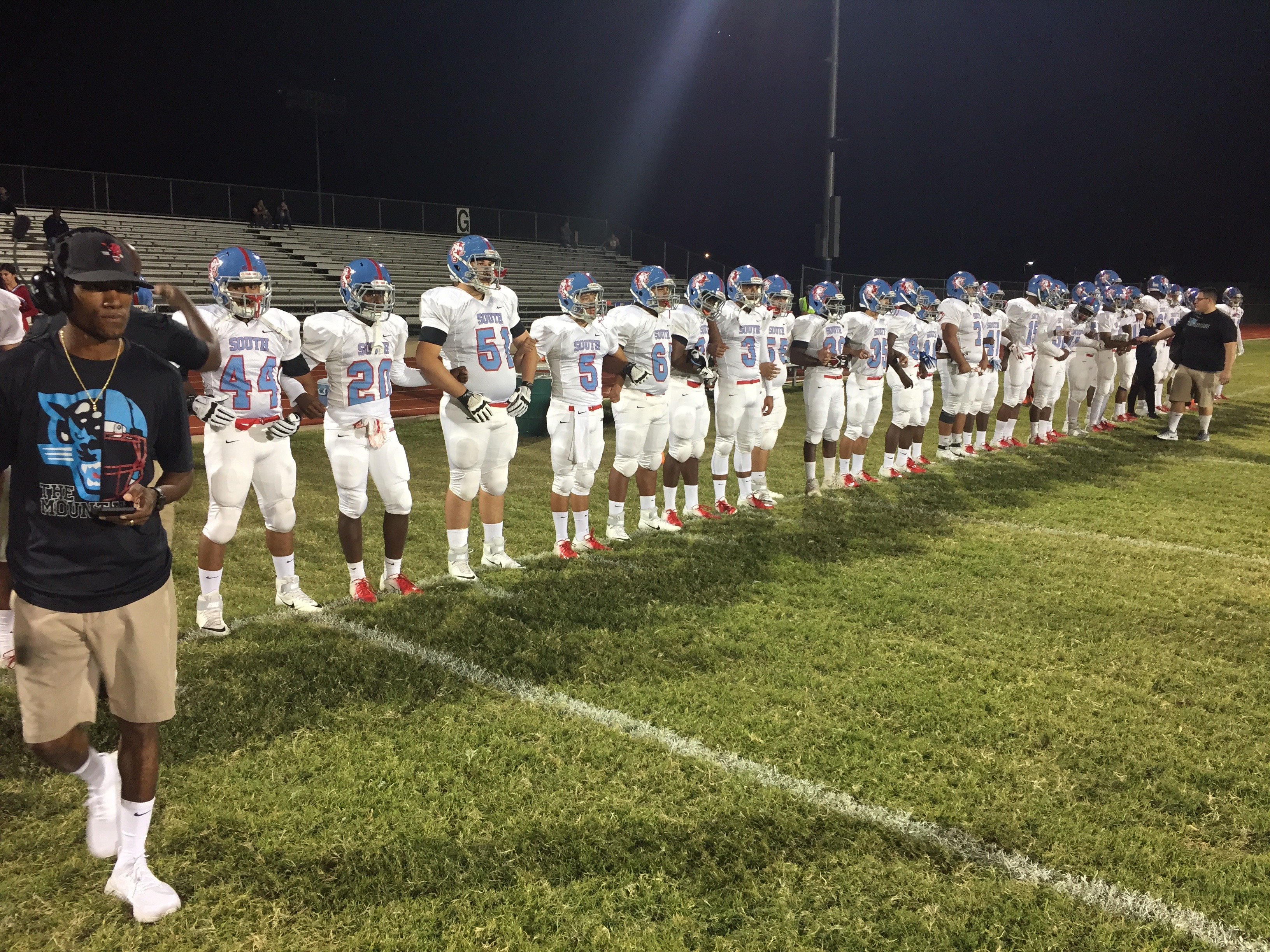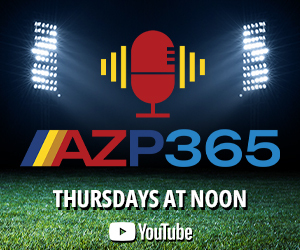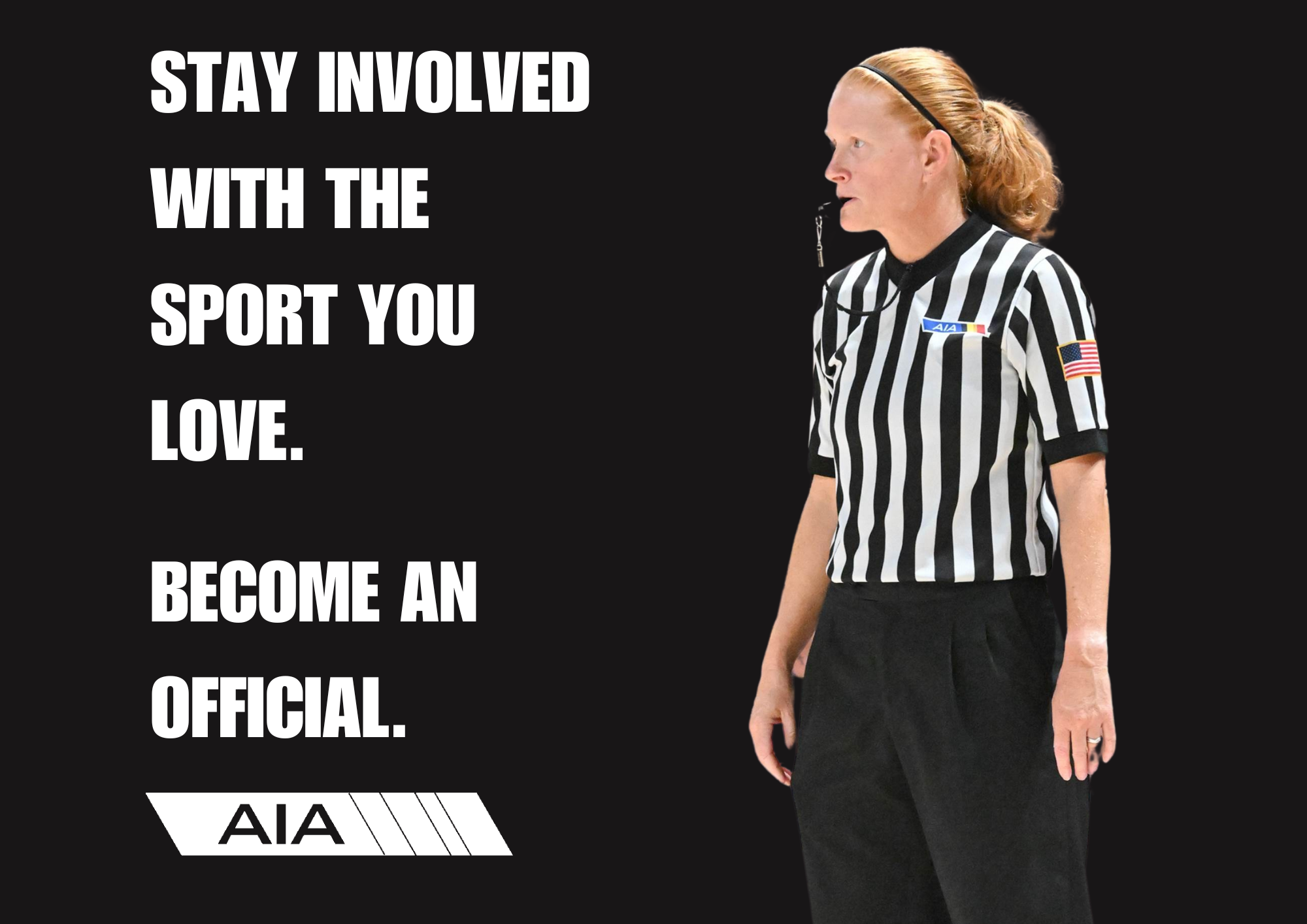The culture in South Phoenix is changing led by the football program
November 27, 2018 by Tyler Manion, Arizona State University

It was a sunny Oct. 6 morning. Marcus Carter was watching his son’s Pop Warner game when another parent approached. “Coach, man, what happened?” asked the gentleman referencing South Mountain’s loss the night before. Carter explained how his team gave up a 20-point lead and the man responded.
“You know what though, that was a great game. I left at halftime but when I left, I live down the street and I could still hear the game going when I was down the street. That hasn’t happened in the south side for years, so I just want to thank you and your staff for changing the culture.”
But that change did not happen overnight. Marcus’ two-minute-older twin brother Mark just finished his third season as Jaguar head coach, with Marcus at his side for the latter two.
There are few players remaining at South Mountain who experienced a non-Carter lead program. Senior offensive tackle Anthony Sanchez is one of them.
“Our seniors my freshman year didn’t really see the program as a football program, more or less a place to go after school because they don’t want to go home,” Sanchez said. “I think the Carters really changed that because people actually want to play the sport now.”
Before the dynamic twin coaches were brought on, South Mountain had accumulated three wins in five years with its last winning season coming in 2008.
This year they went 6-4.
While the Jaguars were suffering in South Phoenix, the Carters were winning state titles in California and learning under Hall of Fame coaches, but they were assistants.
While on the hunt for a head coaching job they came across an opening at South Mountain. When they pulled up to the interview, as was the norm, one brother waited in the car (Marcus) as the other interviewed for the position inside (Mark).
Mark had already made the first cut from 50 applicants to the 21 that were invited for an interview, but there was work to be done.
From the South Mountain perspective, athletic director Brian Fair constructed a panel that spent three straight days excused from teaching and other duties to focus on the hiring of a new football coach.
“When we did the interview Mark stood out because he showed passion, he showed he did some research about the South Phoenix community,” Fair said. “He wasn’t talking about building his resume. He talked about building up the community, building up the school and building up the young men that would be playing for him.”
After a community forum, Carter was hired as the head football coach of South Mountain, his first head coaching job.
Year one was difficult, winning just one game, but the progress was obvious. The program went from nine athletes at the season’s first meeting, to a peak involvement of 40 by the end of the year.
“People frowned upon us in our first year because they would see our players knock a guy down and then stop to turn around and pick the guy up,” Mark said, speaking to the sportsmanship he demands of his players through wins or losses.
Year two saw vast improvements as the program grew to 70 players. Marcus was added to the staff as defensive coordinator and the team finished with a 5-5 record.
“I have never seen anyone jump up Mount Everest, they have to climb. So you might stumble, but as long as you keep progressing, that’s what it’s all about,” Mark said.
Year three brought in over 120 student-athletes. It saw Marcus thrive with the title of co-head coach and the team earned its first winning season in a decade.
The staff preached a motto to their players, ‘CTC’, which stands for ‘Change The Culture’.
“What CTC embodies is we got to start from the inside and work our way out, and then the wins will start to come,” Marcus said. But he made one thing very clear. “CTC is just not about football and I don’t want people to think about us as just football guys, we’re community guys and we come from a community similar to South Mountain.”
The Carters are not guys who just talk, they mean what they say and back it up. In the community they speak at youth events and even put on free clinics for kids to learn the game they love.
Football was their way out and they are teaching South Phoenix youth how to make it theirs. “I tell people all the time especially athletes: don’t let football use you, use football to get where you want to get,” Marcus said.
Both co-head coaches teach at South Mountain during the day. Mark instructs Physical Education while Marcus leads Technology and Social Justice, a program that shows kids how to empower themselves, their families and their community through technology.
This classroom work helps improve students and the community, but not every student can take Marcus’ class or be on the football team. For those community members, South Mountain football games can provide a rallying point a few times per week.
“There’s a lot of people who come to our freshman games and are like, ‘Dang! There’s a lot of people here for a freshman game,’ and same with JV and Varsity. And that’s because the community has something to be proud about,” Mark said. “When you’re team’s getting smacked every week and you have a choice between going somewhere on a Friday, or even a Wednesday or Thursday night, or going to a high school football game, you’re probably going to go somewhere.”
With the recent turnaround in success for the program, Mark said, “They’ve got a team they can be proud of. A team that they can say ‘that’s my school! That’s my team!’ It brings the community together.”
Fair knows the community well. He grew up in South Phoenix and attended South Mountain while starring on the basketball team. The athletic director is a perfect model for the school’s student-athletes.
“We want to see our kids more than anything succeed in life and come back to the community so they can tell their story and uplift the next kid that’s in a similar situation to what they were in,” the former University of Connecticut player said.
Fair has been back at South Mountain for seven years and seen his fare share of ups and downs in the school’s athletics. He recalled that South Mountain was the place to be for stud athletes during his youth, although it has not been in recent years.
After coming back from a professional basketball career overseas, Fair has watched enrollment at South Mountain skyrocket from 1400 to 2300. He has been fully on board with ‘CTC’ since the moment it was pitched and has seen its influence grow.
“It made such an impact on the kids that it started coming into the every day school life. It started to impact our teachers and it started to impact our community because it went from just a South Mountain football thing, to a school thing, to a community thing,” Fair glowingly said. “Now, if you look at some high school websites they actually have CTC on it. And we know that came from South Mountain, that came from coaches Mark and Marcus Carter.”
This season at South Mountain, ineligible players due to grades and discipline for football players hit a low in the Carters’ tenure. They are proud of the culture changes they have accomplished, but know there is still work to be done.
In the squad’s final game of the season against local rival Central, tempers flared and the contest was called early. Although his team had just cemented the program’s best season since 2008, Marcus was not satisfied.
“It was important to me to help them understand that people look down on Phoenix Union, on our district because they think that’s all we do, we’re all thugs and we fight and we don’t know how to act,” the passionate co-head coach said. “So I basically told both teams, ‘Hey men listen. We played a well competitive football game, it was fun, but at the end of the day it’s just a game and you guys are brothers in the whole grand scheme of things. We’re trying to change the perception of Phoenix Union as a whole that we’re just a bunch of knuckleheads cause that’s not us.’”
After Marcus’ speech, the teams that had been fighting each other moments ago hugged it out and took pictures together as brothers fighting for one common goal, to change the culture.



